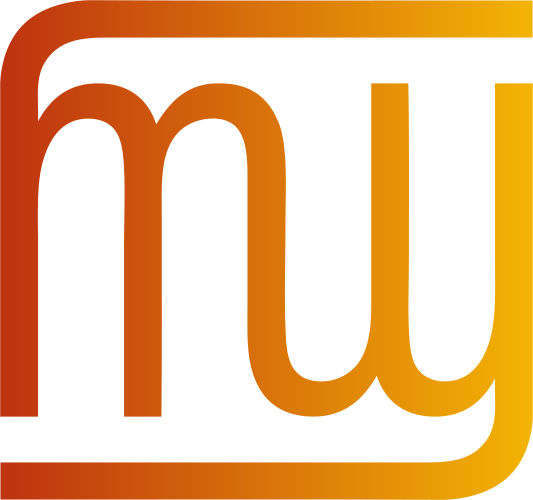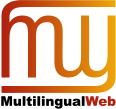
The W3C Internationalization (I18n) Activity works with W3C working groups and liaises with other organizations to make it possible to use Web technologies with different languages, scripts, and cultures. From this page you can find articles and other resources about Web internationalization, and information about the groups that make up the Activity. Read also about opportunities to participate and fund work via the new Sponsorship Program.
What the W3C Internationalization Activity does
Selected quick links
Selected quick links
Selected quick links
Metadata for the Multilingual Web – Usage Scenarios and Implementations Draft Published
The MultilingualWeb-LT Working Group published a First Public Working Draft of Metadata for the Multilingual Web – Usage Scenarios and Implementations. This document introduces a variety of usage scenarios and applications for the Internationalization Tag Set (ITS) 2.0, ranging from simple machine translation or human translation quality check to training for machine translation systems or automatic text analyis. Many of the underlying implemementations will be showcased in the upcoming W3C MultilingualWeb Workshop 12-13 March in Rome.
ECMAScript Internationalization API Specification approved in December
We omitted to mention, back in December, that ECMAScript announced a new standard that better supports a user’s language and culture for applications written in JavaScript (standardized as ECMAScript).
Until now, it has been very difficult for web application designers to do something as simple as sort names correctly according to the user’s language. The new standard ECMA-402 changes this. It provides:
- string comparison for sorting (such as for Swedish, where “ö” is a separate letter that sorts after “z”),
- number and currency formatting (such as “1.234,56 €” for a German language euro presentation, or the following choices for a Serbian language USD presentation: 12.345,12 US$, 12.345,12 USD or 12.345,12 америчких долара),
- date and time formatting capabilities (such as 2012年12月12日 for a Japanese language date, or for a French date: mercredi 12 décembre 2012).
For the first time, applications can choose the language and tailor the functionality to their needs. The standard complements the ECMAScript Language Specification, also published by Ecma as ECMA-262, which defines the core of JavaScript in web browsers, servers, and other software systems.
ECMA-402, ECMAScript Internationalization API Specification, is available free of charge from the Ecma International website. See also An introduction to the standard.
New Unicode FAQ on Private-use Characters, Noncharacters and Sentinels
A new FAQ page devoted to the topic of private-use characters, noncharacters, and sentinels has been posted on the Unicode web site. This FAQ aims to clear up confusion about whether noncharacters are permitted in Unicode text, and how they differ from ordinary private-use characters. The recently published Corrigendum #9: Clarification About Noncharacters makes it clear that noncharacters are permitted even in interchange, and the new FAQ page addresses some of the fine points about their usage and about differences from other types of Unicode code points. The brief mentions of noncharacters in other FAQ pages have also been updated accordingly.
Are you unclear about what Unicode “noncharacters” even are? The new FAQ page also answers basic questions about noncharacters and private-use characters, and provides a bit of history about how they came to be part of the Unicode Standard.
For review: 4 articles about bidi text in HTML
Comments are requested on the following proposed updates to material on the Internationalization site, prior to final publication. NOTE THAT the articles are in a temporary location, and will be moved to their final location after the review.
Text direction and structural markup in HTML
This article has been created from material formerly in the tutorial “Creating HTML Pages in Arabic, Hebrew and Other Right-to-left Scripts” and augmented with information about new HTML5 markup constructs that are beginning to see adoption. It should be regarded as a new article, focusing on applying bidi markup to document- and block-level situations and to forms.
What you need to know about the bidi algorithm and inline markup
This is an update of an existing article. It has been almost completely rewritten. The most significant changes are the new parts describing how to apply the new HTML5 constructs which are beginning to see adoption. Additional changes will be needed as HTML5 bidi markup is finalised over the coming months. The article also proposes a simpler way to approach markup of bidi text, particularly useful for those with less experience, that relies less on a deep understanding of the issues involved.
Visual vs. logical ordering of text
This is a new article created from material that has been removed from the previously mentioned material. It was removed into a separate article because visual ordering is much less important these days, and to avoid duplication. Only a few changes have been made to the content itself.
Creating HTML Pages in Arabic, Hebrew and Other Right-to-left Scripts
This tutorial has been modified to bring it in line with the current tutorial format. Rather than contain duplicate content, it now introduces the novice to key concepts and points off to useful further reading in an organized fashion. It has been completely rewritten.
Please send any comments over the next two weeks to www-international@w3.org (subscribe).
We hope to publish a final version shortly after that.
Program published for MultilingualWeb Workshop in Rome!

The program has been published for the upcoming W3C MultilingualWeb Workshop: Making the Multilingual Web Work in Rome, 12–13 March 2013.
Mark Davis and Vladimir Weinstein of Google will deliver the keynote presentation, “Innovations in Internationalization at Google”. This will be followed by one and a half days of talks on various aspects of what it takes to make multilingualism work on the Web, plus an afternoon of discussion-oriented breakout sessions that focus on best practices for various aspects the multilingual Web. Speakers will come from organizations like Adobe Systems, SAP, Yandex, the Spanish Tax Agency, the U.N. Food and Agriculture Organization, Microsoft, Lionbridge, SDL, the European Commission, and leading universities and research institutions from around the world.
The program will also feature a showcase of implementations of the forthcoming ITS 2.0 specification that will allow attendees to get a sneak peak at how this specification will impact and support multilingual requirements on the Web.
See the Call for Participation for details about how to register for the workshop. Participation in the workshop is free.
Important: The deadline for registration is 8 March, but available attendance slots are filling up fast and are expected to run out before the deadline. So please be sure to register soon to ensure that you can attend.
The MultilingualWeb workshops, funded by the European Commission and coordinated by the W3C, looks at best practices and standards related to all aspects of creating, localizing and deploying the multilingual Web. The workshops are successful because they attracted a wide range of participants, from fields such as localization, language technology, browser development, content authoring and tool development, etc., to create a holistic view of the interoperability needs of the multilingual Web.
We look forward to seeing you in Rome!
Updated article: The byte-order mark (BOM) in HTML
The article The byte-order mark (BOM) in HTML was updated significantly to reflect the fact that the byte-order mark in UTF-8 is less problematic now than it used to be, and that it has a higher precedence than the HTTP header for character encoding detection.
The article was largely rewritten, and now incorporates the relevant information that used to be in the article “Display problems caused by the UTF-8 BOM”. That article has now been decommissioned.
German, Spanish, Russian and Ukrainian translations need to be updated. Translators, please contact Richard Ishida (ishida@w3.org) for the source text.
Unicode in XML and other Markup Languages updated
Minor editorial changes have been made to Unicode in XML and other Markup Languages to fix one typo (“accent” to “acute” in Table 3.1) and update references to the Unicode Standard in the Introduction and References section.
Substantive updates are currently on hold, pending final decisions relating to new developments to be introduced with HTML5.
This document is simultaneously published by the Unicode Consortium as Unicode Technical Report #20.
Breakout session on best practices for Multilingual Linked Open Data at W3C Multilingual Web Workshop, Rome, 2013

Linked Open Data has emerged as a critical issue for organizations seeking to make their data more valuable and accessible. However, working with multilingual linked open data (MLOD) poses special challenges that require careful consideration. A special breakout session at the W3C Multilingual Web Workshop in Rome (March 12–13, 2013), facilitated by eight leading MLOD practitioners, will focus on gathering a common set of requirements for implementing best practices in MLOD.
The session aims to crowd-source ideas from the community regarding best practices for MLOD. A number of short lightning presentations will be given, followed by an open discussion with a shared common output. A high level overview of this output will be presented back to the MLW community during the conference with a reference white paper to be published later based on the output of the breakout session. Participants are encouraged to bring their ideas and solutions for discussion.
Participation in this breakout session and the Multilingual Web Workshop is free of charge. See http://multilingualweb.eu/documents/rome-workshop/rome-lod for more details.
Speaker deadline for Rome MultilingualWeb Workshop this Friday (Jan. 18)

The deadline for speaker submissions for the 6th MultilingualWeb Workshop (March 12–13, 2013 in Rome, Italy) is this Friday (January 18 at 23:59 UTC).
With a keynote by Mark Davis and Vladimir Weinstein (Google), special breakout sessions on linked open data and other critical topics, this Workshop is set to continue the tradition of excellence set by the previous six Workshops, and will provide an outstanding forum for thought leaders to share their ideas and gain critical feedback.
While the organizers have already received many excellent submissions, there is still time to make a proposal, and we encourage interested parties to do so by the deadline. With over 100 attendee registrations already submitted for the Workshop, we are certain to have a large and diverse audience and stimulating discussion about all of the presentations.
For more information, please visit the Rome Workshop Call for Participation.
Mark Davis and Vladimir Weinstein (Google) to deliver keynote, “Innovations in Internationalization at Google,” at MultilingualWeb Workshop

Mark Davis (President and Cofounder, Unicode Consortium, and Software Engineer, Unicode and ICU, Google) and Vladimir Weinstein (Engineering Manager, Google) will deliver the keynote talk at the upcoming 6th MultilingualWeb Workshop in Rome, Italy (March 12–13).
The keynote will discuss how Google supports its ambitious goals of removing barriers to information, in an ever increasing number of languages, through recent innovations in internationalization technology.
The MultilingualWeb workshop series examines best practices and standards related to all aspects of creating, localizing and deploying the Web multilingually. It aims to raise the visibility of existing best practices and standards and identify gaps, with a view to helping content creators, localizers, tools developers, and others meet the challenges of the multilingual Web.
Participation is free. We welcome participation from both speakers and non-speaking attendees. For more information and to register, see the Call for Participation.
W3C® liability, trademark and permissive license rules apply.
Questions or comments? ishida@w3.org